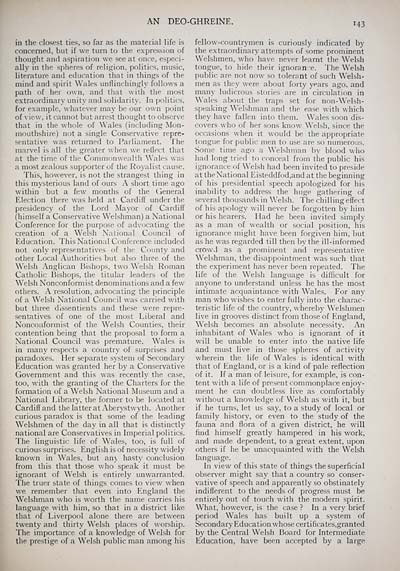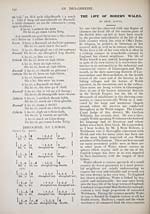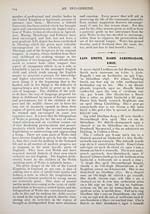Blair Collection > Deo-gréine
(167)
Download files
Complete book:
Individual page:
Thumbnail gallery: Grid view | List view

AN DEO-GHREINE.
H3
in the closest ties, so far as the material life is
concerned, but if we turn to the expression of
thought and aspiration we see at once, especi-
ally in the spheres of religion, politics, music,
literature and education that in things of the
mind and spirit Wales unflinchingly follows a
path of her own, and that with the most
extraordinary unity and solidarity. In politics,
for example, whatever may be our own point
of view, it cannot but arrest thought to observe
that in the whole of Wales (including Mon-
mouthshire) not a single Conservative repre-
sentative was returned to Parliament. The
marvel is all the greater when we reflect that
at the time of the Commonwealth Wales was
a most zealous supporter of the Royalist cause.
This, however, is not the strangest thing in
this mysterious land of ours A short time ago
within but a few months of the General
Election there was held at Cardiff under the
presidency of the Lord Mayor of Cardiff
(himself a Conservative Welshman) a National
Conference for the purpose of advocating the
creation of a Welsh National Council of
Education. This National Conference included
not only representatives of the County and
other Local Authorities but also three of the
Welsh Anglican Bishops, two Welsh Roman
Catholic Bishops, the titular leaders of the
Welsh Nonconformist denominations and a few
others. A resolution, advocating the principle
of a Welsh National Council was carried with
but three dissentients and these were repre-
sentatives of one of the most Liberal and
Nonconformist of the Welsh Counties, their
contention being that the proposal to form a
National Council was premature. Wales is
in many respects a country of surprises and
paradoxes. Her separate system of Secondary
Education was granted her by a Conservative
Government and this was recently the case,
too, with the granting of the Charters for the
formation of a Welsh National Museum and a
National Library, the former to be located at
Cardiff and the latter at Aberystwyth. Another
curious paradox is that some of the leading
Welshmen of the day in all that is distinctly
national are Conservatives in Imperial politics.
The linguistic life of Wales, too, is full of
curious surprises. English is of necessity widely
known in Wales, but an) hasty conclusion
from this that those who speak it must be
ignorant of Welsh is entirely unwarranted.
The truer state of things comes to view when
we remember that even into England the
Welshman who is worth the name carries his
language with him, so that in a district like
that of Liverpool alone there are between
twenty and thirty Welsh places of worship.
The importance of a knowledge of Welsh for
the prestige of a Welsh public man among his
fellow-countrymen is curiously indicated by
the extraordinary attempts of some prominent
Welshmen, who have never learnt the Welsh
tongue, to hide their ignorance. The Welsh
public are not now so tolerant of such Welsh-
men as they were about forty years ago, and
many ludicrous stories are in circulation in
Wales about the traps set for non-Welsh-
speaking Welshman and the ease with which
they have fallen into them. Wales soon dis-
covers who of her sons know Welsh, since the
occasions when it would be the appropriate
tongue for public men to use are so numerous.
Some time ago a Welshman by blood who
had long tried to conceal from the public his
ignorance of Welsh had been invited to preside
at the National Eisteddfod,and at the beginning
of his presidential speech apologized for his
inability to address the huge gathering of
several thousands in Welsh. The chilling effect
of his apology will never be forgotten by him
or his hearers. Had he been invited simply
as a man of wealth or social position, his
ignorance might have been forgiven him, but
as he was regarded till then by the ill-informed
crowd as a prominent and representative
Welshman, the disappointment was such that
the experiment has never been repeated. The
life of the Welsh language is difficult for
anyone to understand unless he has the most
intimate acquaintance with Wales. For any
man who wishes to enter fully into the charac-
teristic life of the country, whereby Welshmen
live in grooves distinct from those of England,
Welsh becomes an absolute necessity. An
inhabitant of Wales who is ignorant of it
will be unable to enter into the native life
and must live in those spheres of activity
wherein the life of Wales is identical with
that of England, or is a kind of pale reflection
of it. If a man of leisure, for example, is con-
tent with a life of present commonplace enjoy-
ment he can doubtless live as comfortably
without a knowledge of Welsh as with it, but
if he turns, let us say, to a study of local or
family history, or even to the study of the
fauna and flora of a given district, he will
find himself greatly hampered in his work,
and made dependent, to a great extent, upon
others if he be unacquainted with the Welsh
language.
In view of this state of things the superficial
observer might say that a country so conser-
vative of speech and apparently so obstinately
indifferent to the needs of progress must be
entirely out of touch with the modern spirit.
What, however, is the case ? In a very brief
period Wales has built up a system of
Secondary Education whose certificates, granted
by the Central Welsh Board for Intermediate
Education, have been accepted by a large
H3
in the closest ties, so far as the material life is
concerned, but if we turn to the expression of
thought and aspiration we see at once, especi-
ally in the spheres of religion, politics, music,
literature and education that in things of the
mind and spirit Wales unflinchingly follows a
path of her own, and that with the most
extraordinary unity and solidarity. In politics,
for example, whatever may be our own point
of view, it cannot but arrest thought to observe
that in the whole of Wales (including Mon-
mouthshire) not a single Conservative repre-
sentative was returned to Parliament. The
marvel is all the greater when we reflect that
at the time of the Commonwealth Wales was
a most zealous supporter of the Royalist cause.
This, however, is not the strangest thing in
this mysterious land of ours A short time ago
within but a few months of the General
Election there was held at Cardiff under the
presidency of the Lord Mayor of Cardiff
(himself a Conservative Welshman) a National
Conference for the purpose of advocating the
creation of a Welsh National Council of
Education. This National Conference included
not only representatives of the County and
other Local Authorities but also three of the
Welsh Anglican Bishops, two Welsh Roman
Catholic Bishops, the titular leaders of the
Welsh Nonconformist denominations and a few
others. A resolution, advocating the principle
of a Welsh National Council was carried with
but three dissentients and these were repre-
sentatives of one of the most Liberal and
Nonconformist of the Welsh Counties, their
contention being that the proposal to form a
National Council was premature. Wales is
in many respects a country of surprises and
paradoxes. Her separate system of Secondary
Education was granted her by a Conservative
Government and this was recently the case,
too, with the granting of the Charters for the
formation of a Welsh National Museum and a
National Library, the former to be located at
Cardiff and the latter at Aberystwyth. Another
curious paradox is that some of the leading
Welshmen of the day in all that is distinctly
national are Conservatives in Imperial politics.
The linguistic life of Wales, too, is full of
curious surprises. English is of necessity widely
known in Wales, but an) hasty conclusion
from this that those who speak it must be
ignorant of Welsh is entirely unwarranted.
The truer state of things comes to view when
we remember that even into England the
Welshman who is worth the name carries his
language with him, so that in a district like
that of Liverpool alone there are between
twenty and thirty Welsh places of worship.
The importance of a knowledge of Welsh for
the prestige of a Welsh public man among his
fellow-countrymen is curiously indicated by
the extraordinary attempts of some prominent
Welshmen, who have never learnt the Welsh
tongue, to hide their ignorance. The Welsh
public are not now so tolerant of such Welsh-
men as they were about forty years ago, and
many ludicrous stories are in circulation in
Wales about the traps set for non-Welsh-
speaking Welshman and the ease with which
they have fallen into them. Wales soon dis-
covers who of her sons know Welsh, since the
occasions when it would be the appropriate
tongue for public men to use are so numerous.
Some time ago a Welshman by blood who
had long tried to conceal from the public his
ignorance of Welsh had been invited to preside
at the National Eisteddfod,and at the beginning
of his presidential speech apologized for his
inability to address the huge gathering of
several thousands in Welsh. The chilling effect
of his apology will never be forgotten by him
or his hearers. Had he been invited simply
as a man of wealth or social position, his
ignorance might have been forgiven him, but
as he was regarded till then by the ill-informed
crowd as a prominent and representative
Welshman, the disappointment was such that
the experiment has never been repeated. The
life of the Welsh language is difficult for
anyone to understand unless he has the most
intimate acquaintance with Wales. For any
man who wishes to enter fully into the charac-
teristic life of the country, whereby Welshmen
live in grooves distinct from those of England,
Welsh becomes an absolute necessity. An
inhabitant of Wales who is ignorant of it
will be unable to enter into the native life
and must live in those spheres of activity
wherein the life of Wales is identical with
that of England, or is a kind of pale reflection
of it. If a man of leisure, for example, is con-
tent with a life of present commonplace enjoy-
ment he can doubtless live as comfortably
without a knowledge of Welsh as with it, but
if he turns, let us say, to a study of local or
family history, or even to the study of the
fauna and flora of a given district, he will
find himself greatly hampered in his work,
and made dependent, to a great extent, upon
others if he be unacquainted with the Welsh
language.
In view of this state of things the superficial
observer might say that a country so conser-
vative of speech and apparently so obstinately
indifferent to the needs of progress must be
entirely out of touch with the modern spirit.
What, however, is the case ? In a very brief
period Wales has built up a system of
Secondary Education whose certificates, granted
by the Central Welsh Board for Intermediate
Education, have been accepted by a large
Set display mode to: Large image | Transcription
Images and transcriptions on this page, including medium image downloads, may be used under the Creative Commons Attribution 4.0 International Licence unless otherwise stated. ![]()
| Early Gaelic Book Collections > Blair Collection > Deo-gréine > (167) |
|---|
| Permanent URL | https://digital.nls.uk/76699530 |
|---|
| Description | A selection of books from a collection of more than 500 titles, mostly on religious and literary topics. Also includes some material dealing with other Celtic languages and societies. Collection created towards the end of the 19th century by Lady Evelyn Stewart Murray. |
|---|
| Description | Selected items from five 'Special and Named Printed Collections'. Includes books in Gaelic and other Celtic languages, works about the Gaels, their languages, literature, culture and history. |
|---|

